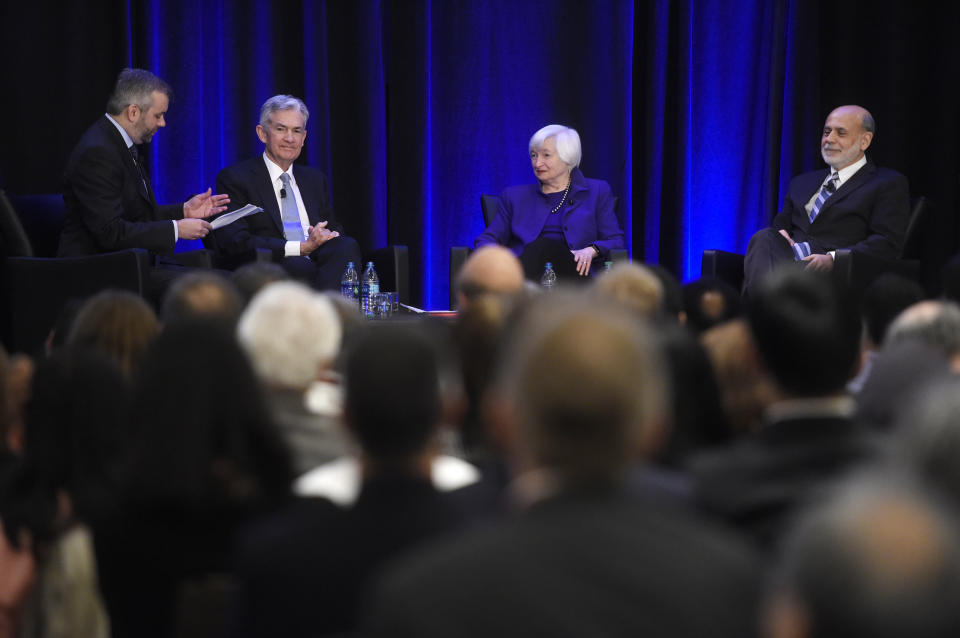Fed Chair Powell communicates that monetary policy is not on autopilot
Federal Reserve Chairman Jerome Powell said Friday that the blowout jobs report was “very, very welcome” and said the central bank is flexible on how it unwinds its massive balance sheet.
In his first public appearance since the December meeting where the Fed raised rates by 25 basis points, Powell did not appear worried about downside risks in 2019, saying that U.S. data broadly appears to be “on track to sustain good momentum into the new year.”
He pointed to the jobs report released by the Bureau of Labor Statistics this morning, which showed nonfarm payrolls rising by 312,000 in December with unemployment ticking up to 3.9% and year-over-year wage growth at 3.2%. In conjunction with strong readings on consumer spending, Powell said the data-dependent Fed is getting positive signals from the economy.
“I would say those were all good data points,” Powell said, noting however that manufacturing readings have been “well below expectation.”
Regarding the gain in wage growth, Powell said “at this time this does not raise concerns about too-high inflation.” This suggests the Fed is under less pressure to tighten monetary policy quickly.

Wouldn’t hesitate to change the pace of balance sheet reduction
Powell also addressed the Fed’s process of quantitative tightening, or allowing its large holdings of Treasurys and mortgage-backed securities to roll off its balance sheet at a $50-billion-a-month pace. Markets interpreted his December remarks as a sign that the Fed was unwilling to take the unwind off “autopilot.”
Today, Powell said he had all along signaled that the Fed would be prepared to adjust its normalization process to align with its dual mandate of maximum employment and price stability.
“We wouldn’t hesitate to change it, that would include the balance sheet,” Powell said.
Powell acknowledged that markets have been sensitive to the Fed’s pursuit of shrinking of its balance sheet, but said the central bank has emphasized its use of the benchmark interest rate as the primary monetary policy tool.
“We didn’t want to have two active tools going at once,” Powell said.
“We’re willing to revisit our views of what the natural rate is”
On the overall economic outlook, Powell said that while he still sees “moderate growth” ahead, he acknowledges the conflicting signals coming from the data readings and the financial markets.
“You do have this difference between, on the one hand, strong data, and some tension between financial markets that are signaling concern and downside risks,’’ he said.
Powell said the central bank is watching to what markets are doing, adding that the recent sell-off is likely an indicator of the market “pricing in downside risk.”
The Fed Chair acknowledged that the dissonance between markets and the economic data are presenting a unique challenge for policymakers trying to locate the longer-run “neutral rate” of the economy. For example, a higher unemployment rate from the December jobs report raises questions about how much slack is in the labor market and whether or not that should push the Fed to revise its estimates for where the equilibrium interest rate for the U.S. economy is.
“We’re willing to revisit our views of what the natural rate is and our understanding of it,” Powell said.
Powell, speaking alongside former Fed Chairs Janet Yellen and Ben Bernanke, also fielded some questions regarding Fed independence. Amid rumors that the White House is considering calling Powell in for a meeting, the Fed Chair said he has no scheduled meeting with President Donald Trump. Powell was also asked about whether or not he would resign from his post if asked to do so.
“No,” Powell said.
Brian Cheung is a reporter covering the banking industry and the intersection of finance and policy for Yahoo Finance. You can follow him on Twitter @bcheungz.
Read more:
Warren turns up rhetoric against Wall Street in 2020 bid
Leveraged loans aren't as attractive as they used to be
Banks wave off Mnuchin's concerns over liquidity
House Republican to regulators: Ease Volcker rule on large banks
Congress may have accidentally freed nearly all banks from the Volcker Rule

